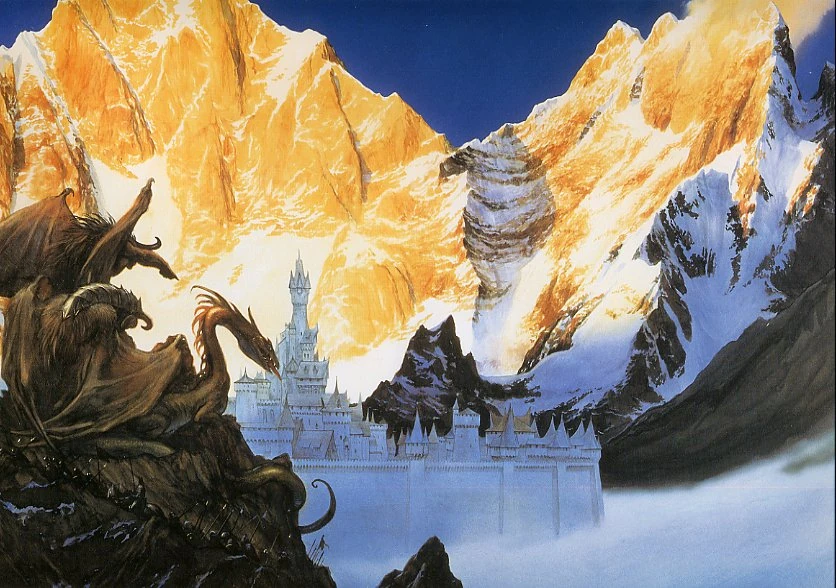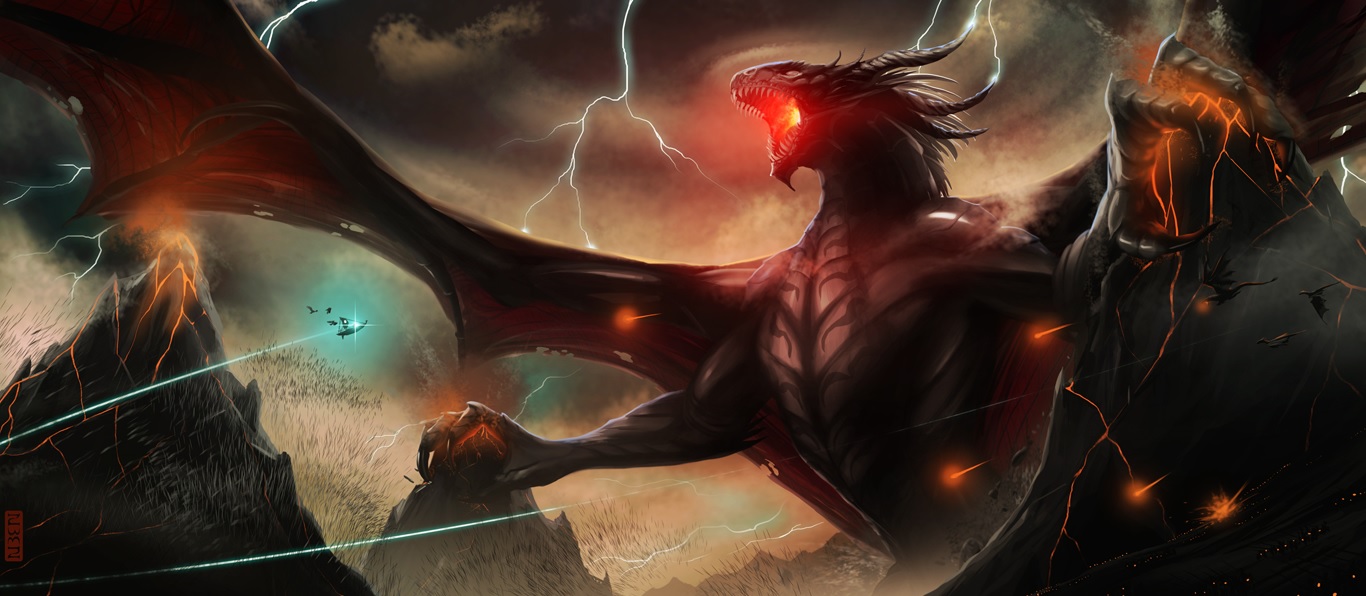Tolkienian Speculative Guessing III: Time Flows Still at the Iron Hill
Having taken a look at what might have happened had the Ringwraiths acted rationally, and what might have happened had Galadriel claimed the Ring, today is another venture into the muddy waters of Tolkienian alternate history…
What would have happened if Fingolfin did not despair in the aftermath of the Dagor Bragollach?

Recall that in The Silmarillion, the fourth of the great battles of Beleriand sees a crushing victory for Morgoth. Fingolfin, the High-King of the Noldor, loses his mind to despair, and rides to the gates of Angband to challenge the Dark Lord to a one-on-one duel. Morgoth wins, of course, but not until after Fingolfin wounds him seven times.
(For perspective, our Elven lord has just ridden to the gates of Hell itself, challenged the Devil to single combat, and given the Devil a lasting limp. The scene is that breathtaking).
But suppose Fingolfin does not throw it all away on suicide by Dark Lord. Suppose that the patient, determined Fingolfin who led his people across the Grinding Ice for twenty-seven years reasserts himself. That he decides to wait another day… what happens?
Well, the Doylist approach is that we are suddenly robbed of both Ted Nasmith’s visual depiction of the duel and Blind Guardian’s auditory version. And this lovely piece of Tolkienian prose:
“Therefore Morgoth came, climbing slowly from his subterranean throne, and the rumour of his feet was like thunder underground. And he issued forth clad in black armour; and he stood before the King like a tower, iron-crowned, and his vast shield, sable unblazoned, cast a shadow over him like a stormcloud. But Fingolfin gleamed beneath it as a star; for his mail was overlaid with silver, and his blue shield was set with crystals; and he drew his sword Ringil, that glittered like ice.”
Damn it, Fingolfin, why be cautious? So much art is hinging on you…
From a Watsonian angle, Fingolfin surviving might mean that much of what we think of as The Silmarillion and The Lord of the Rings never happens. And, for the purposes of Tolkienian alternate history, it is the in-universe Watsonian approach that is of interest. The problem is that it is much easier in this situation to say what doesn’t happen, rather than what does…
**
Fingolfin surviving does not alter Beren and Lúthien, so Finrod Felagund still dies, and Thingol of Doriath still ends up with a silmaril. It is possible that Celegorm and Curufin are more hesitant with their designs on Lúthien with their uncle still alive, but I doubt it – Celegorm was thinking with his penis, rather than his brain, and, frankly, the political fall-out was disastrous enough without needing Fingolfin to slap the Sons of Feanor down personally.
The first major point of difference is the Union of Maedhros and the Nirnaeth Arnoediad. While Maedhros may still instigate the grand alliance of Elves, Men, and Dwarves, it is much more likely to be named the Union of Fingolfin… which helps public relations no-end, because it lacks the toxic association with the Sons of Feanor. This means that Orodreth and Nargothrond are likely to send their full quota (Thingol and Doriath remain unlikely). Assuming similar tactics to the actual Nirnaeth, having Orodreth rather than Gwindor in charge of the (much larger) Nargothrond force means that the battle goes more smoothly for the Union, since Orodreth is not going to be provoked via Gelmir. It is also possible that Fingolfin might avoid Maedhros’ mistake of declaring himself too soon (a guess, rather than an assertion. Quite apart from the Union, Maedhros did err earlier in getting himself captured by Morgoth, so our red-haired Elf-lord is not the best at anticipating the Dark Lord’s responses).
So a larger Union force, with better tactics… this gives the Elves and allies a better chance of winning the battle. The objection is that Uldor will still betray everyone, and everyone always blames Uldor, but I would point out that Uldor is a mercenary bastard, and mercenaries know that a winning side pays better than a losing side, regardless of promises. So Uldor might even re-rat on Morgoth. Potentially. Alternate history is fuzzy, fictional or otherwise. I am going to stick my neck out and suggest that Fingolfin not dying turns the Nirnaeth into a victory (and, of course, it acquires a different name…). So the War of the Jewels returns to the pre-Bragollach status quo, with a couple of differences – the Elves are going to be far more cautious in how they go about a revived Siege of Angband, and the Anfauglith is still a desert.
A victorious Nirnaeth no longer requires the Men of Hithlum to fight a rear-guard battle to allow Turgon to escape. Húrin is not captured, and his family is spared Morgoth’s curse. It is still possible Túrin goes on to make poor life choices (for possible, read nigh-certain), but he remains in Hithlum, absent any curses, rather than going to Doriath. So Saeros lives. He never interacts with Petty-Dwarves. So Beleg lives. He never comes to Nargothrond. So Finduilas lives, and indeed marries Gwindor. Nargothrond itself survives. Túrin and his sister never encounter Glaurung, averting their incest and suicides. Meanwhile, Brodda, Aerin, Brandir, and Glaurung himself live.
Húrin never has to watch his family destroy itself. So he does not wander through Beleriand. He does not accidentally tip-off Morgoth as to the general location of Gondolin. He does not kill Mîm, and bring the Nauglamír to Doriath. Without the Nauglamír, Thingol never gets the idea of putting the silmaril as part of the Necklace, so never gets into a dispute with the Dwarves. So Thingol lives, Melian never abandons Menegroth, and Doriath is never left vulnerable to attack (the Sons of Feanor are not getting past the Girdle). Meanwhile, Húrin never throws himself into the Sea by way of final despair. In short, the tragedy of The Children of Húrin never happens, and Nargothrond and Doriath remain standing.

And the third hidden Elven realm, Gondolin?
As mentioned, Húrin does not tip-off Morgoth, but one can go further. With Hithlum still under the rule of the House of Hador, Tuor remains there – and does not hear Ulmo’s message. So Tuor never comes to Gondolin, and never falls in love with Idril (Idril still rejects Maeglin, as before). With Morgoth’s forces cooped up in Angband, Maeglin does not get captured by Orcs. Between there being no Tuor in Gondolin and not getting tortured in Angband, Maeglin does not betray the city. So Gondolin survives too.
Meanwhile, no Tuor-Idril marriage means no Eärendil. Someone else is going to make that pilgrimage, if it happens (and, as we’ll see shortly, there might not be time). No Eärendil means no Elrond or Elros. So Rivendell never gets founded, and the line of Elros never gets going. So if Númenor happens, it’s a different royal family. No Elendil, no Isildur, and, eventually, no Aragorn. Fingolfin’s fateful bout of despair alters The Lord of the Rings out of all recognition, never mind The Silmarillion – assuming Thangorodrim gets broken at all.
So all this adds up to a status quo scenario with Nargothrond, Doriath, and Gondolin all continuing happily, and a large number of people living, or not being born, rather than dying. The Noldor once again lay siege to Angband, and Morgoth is unable to break out, again. Does Fingolfin not despairing therefore lead to an eternal stalemate?
Well, no. Something is going to break the stalemate.
And, if I were to hazard a guess, that something is going to be Ancalagon the Black and the winged dragons. With the eventual prospect of Ancalagon unleashed against Fingolfin’s Noldorin forces, rather than against the entire Host of the West, time is certainly on Morgoth’s side – as is the Doom of Mandos, of course. Meawhile, an Ancalagon loose over Beleriand endangers Gondolin, and potentially Doriath (depending on whether the Girdle of Melian extends upwards), though underground Nargothrond is as safe as anywhere. And, with the silmaril still stored safely in Menegroth, who would think to use it in a desperate voyage to Valinor? Never mind Eärendil, there might not even be time for a Voronwe.
The answer to the question of what happens if Fingolfin does not despair?

Everyone, Fingolfin or otherwise, ends up as food for a gigantic flying lizard.
(Which as a concluding side-note, ties in perfectly with Tolkien’s themes. Fingolfin’s death and the Nirnaeth Arnoediad are simultaneously explorations of the grand futility of the Northern Theory of Courage, and an exploration of how evil’s victory is itself self-defeating. Based off the above, a Morgoth that loses the Nirnaeth would ironically be in a better position than one that wins it… and recall from the Music that the most triumphant notes of evil are turned to good. Clever guy, that Tolkien).

Pingback: Tolkienian Speculative Guessing IV: YOU… SHALL… PASS! | A Phuulish Fellow